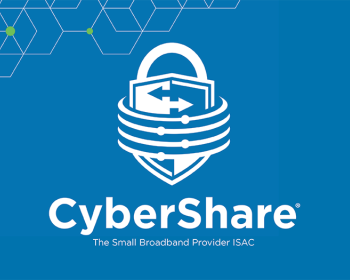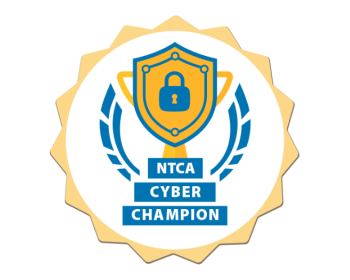Cybersecurity
Cyberthreats are evolving, becoming more sophisticated and proliferating throughout the online ecosystem. In response to members’ needs, NTCA created CyberShare: The Small Broadband Provider ISAC. CyberShare promotes the resiliency and continuity of operation of small network operators across the United States. CyberShare collects and disseminates threat information, indicators and mitigation strategies from a variety of public and private sources and facilitates communications among participants.
NTCA is also an active participant in public-private information-sharing venues, including the Communications ISAC, which enables network operators and government agencies to exchange cyberthreat information, and the CSCC, which coordinates with policymakers and other government agencies on planning and policy. To help small broadband providers in their cybersecurity efforts, NTCA also provides comprehensive guides designed to help executives, board officers and operational staff develop a risk-management approach to cybersecurity and hosts the annual CyberShare Summit with CyberShare each fall.
Why it Matters
When it comes to cybersecurity, putting your head in the sand is not a solution. Small businesses are a deliberate target. 70% of cyber attacks target small businesses and 61% of all small businesses have reported at least one cyberattack during the previous year.
Small companies report that their biggest obstacles to becoming secure are: technical and financial challenges in embedding security in networks, lack of support from management, employees that are not aware of their role in security and lack of time and/or personnel to keep pace with changing technologies.

CyberShare: The Small Broadband Provider ISAC
CyberShare: The small broadband provider ISAC promotes the resiliency and continuity of operation of small network operators across the United States. CyberShare collects and disseminates threat information, indicators and mitigation strategies from a variety of public and private sources and facilitates communications among participants.

Provider Resources
NTCA has resources available to small broadband providers to help them implement cybersecurity plans in response to increased cyberattacks and evolving government regulations. This includes the NTCA Cybersecurity Series, a comprehensive guide consisting of six components designed to help executives, board officers and operational staff develop a risk management approach to cybersecurity.

Consumer Resources
NTCA has created and compiled resources for providers to help their customers stay safe online. The resources are focused on four critical but easy-to-digest topics: multi-factor authentication, passwords and password managers, software updates, and phishing.

Apply for the NTCA Cyber Champion Award
The NTCA Cyber Champion Award recognizes NTCA members who are committed to securing their networks, assets and sensitive customer information. NTCA Cyber Champions participate in collaborative efforts within the industry’s cyber community and demonstrate a commitment to ongoing improvement in cybersecurity measures.

CyberShare Summit
October 6-8, 2025 | Talking Stick Resort | Scottsdale, AZ
With cyberthreats on the rise, there has never been a more critical time to protect your systems, assets, data, and, most importantly, your customers. Your community relies on you to stay up to date on cyberthreats and vulnerabilities and to protect the network they depend on.
Transform information into action at the 2025 CyberShare Summit. This summit is hosted by CyberShare: The Small Broadband Provider ISAC.

NTCA Emphasizes Timely, Costly Impacts of ROV
NTCA submitted comments to the National Institute of Standards and Technology (NIST) pertaining to its Border Gateway Protocol Security and Resilience Initial Public Draft. In its comments, NTCA emphasized that expecting small broadband providers to undergo the costly and time-consuming task of conducting Route Origin Validation (ROV) adds virtually no additional routing security and would result in small providers having to focus their time and money on ROV rather than other cyber practices that they have determined are more effective for their networks.
